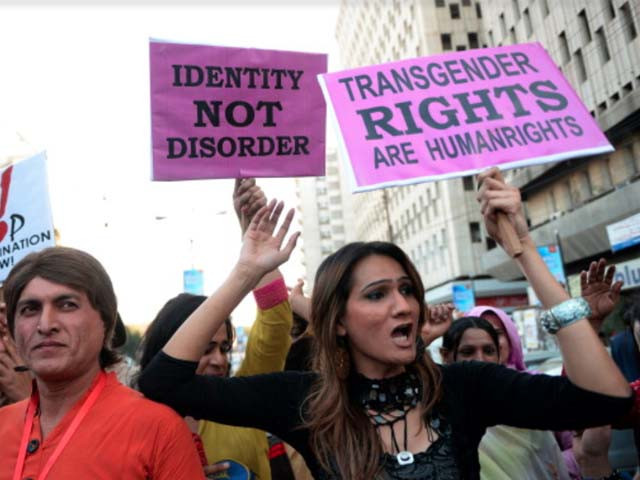The Transgender Persons (Protection of Rights) Act, passed in 2018 for the purpose of providing fundamental human rights to the Khwajasira (transgender) community of Pakistan, has recently sparked a new debate in the country. Four years after the bill’s passing in the parliament, right-wing political parties have come forward to condemn the bill as they believe that the bill promotes “homosexuality” and “anyone can get his/her sex changed”, which might lead to “new social problems”.
A large number of people started supporting this agenda on social media as a result of disinformation being spread by the religio-political parties. This piece is aimed to analyse those clauses of the Transgender Persons Act that are being twisted to present a certain false narrative, the way transgender persons see this debate, and what can be the impact of this incitement of hatred against transgender individuals.
The bill starts with the definition of a transgender person as:
(a) intersex with mixture of male and female genital features,
(b) eunuch who is assigned male at birth but later undergoes surgery,
(c) a transgender person whose gender identity differs from the social expectations of the gender they were assigned at birth.
The second chapter of the bill talks about the recognition of the identity of transgender persons by maintaining that these individuals can get themselves identified on the basis of “self-perceived identity” under the provisions of this bill. In other words, any person who falls under the category of any of the aforementioned three clauses can get registered as a transgender. In the Computerized National Identity Card (CNIC), there are three options provided for gender: ‘M’ for males, ‘F’ for females, and after the Transgender Persons Act 2018, transgender individuals can register as ‘X’.
The remaining chapters of the bill discuss the prohibition of discrimination against trans people, government’s obligations towards this community, and the protection of rights of this gender group.
Now, right-wing parties have misinterpreted the definition of “transgender” mentioned in the bill to further their political agendas under the pretext of homosexuality. If we probe into the relationship among gender identity, gender expression and gender assigned at birth, Iran is one of the Muslim countries that can be taken as an example to understand the situation from an Islamic perspective. In Iran, homosexuality is a punishable crime, where punishment ranges from receiving lashings to death sentences. However, Iran is also one of the Muslim countries which gives its trans citizens the right to have their gender identity acknowledged and recognised by law. Since the Islamic Revolution in Iran, a fatwa was passed to declare hormone-replacement therapy and gender-confirmation surgery as religiously acceptable procedures.
Pakistan’s law minister, Azam Nazeer Tarar, mentioned in a press conference that the bill was passed in 2018 after seeking approval from the Islamic Ideology Council of Pakistan as well as the religious leadership in the parliament. Rehashing this debate, four years after the bill was passed, is nothing more than a political stratagem using the religion card.
To discuss the delicacy of this matter, I spoke to a transgender medical student in Karachi, Masooma, who said:
“A large number of transgender people have been killed in Karachi and other areas after the hate speeches made by some religious political parties. Various politicians belonging to these religious parties are running a vendetta against the Transgender Persons Act under the guise of stopping ‘same sex marriages’, but they have failed to bring up even a single clause of the Act which states anything regarding the marriage or family of transgender people. They are making a whole lot of fuss about an issue that has not even been talked about in the said Act.”
There is also a debate going on among the religious vendettas about the medical examination of transgender people before issuing them their CNICs. Sharing her views on the issue, Masooma stated:
“No medical diagnostic procedure or equipment is available in Pakistan to declare certain individuals as truly trans-persons, and the bill gives no one a free hand to get their gender documented as per their own wish. No one can do that.”
To invigorate this argument, the National Database and Registration Authority (NADRA) does not have a record of even a single registration where a man masqueraded himself to be a woman on his CNIC and vice versa since the passing of this bill in 2018. This fact alone contradicts the narrative being put forward by the religious political parties.
Other activists also maintain that no provision is available in the laws or Islamic jurisprudence in Pakistan regarding the marriage of transgender people.
“If a man has a gender identity conflict and goes to NADRA to get his gender changed in the documents, his gender will be changed from that of M (male) to X (transgender). Pakistan is a country where no marriage law exists for the transgender persons,” quotes Mehrub Moiz Awan, a popular and vocal transgender activist.
Hence, creating an issue out of a non-existent aspect is totally baseless and is only being done to bag votes in the upcoming elections next year. The transgender community is putting in their maximum effort to let their voices be heard but a large part of the population tends to believe in the concocted religious descriptions without investigating the true nature of the issue. Ultimately, this is resulting in an increase in violence and hatred against the transgender community, who are already a marginalised segment of our society.



COMMENTS
Comments are moderated and generally will be posted if they are on-topic and not abusive.
For more information, please see our Comments FAQ